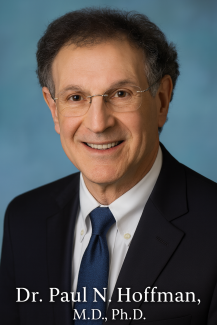Tribute to Dr. Paul N. Hoffman, M.D., Ph.D.

the ISSUP community honors the life and legacy of Dr. Paul N. Hoffman, Professor Emeritus of Neurology and Ophthalmology at Johns Hopkins Medicine, who passed away on October 24, 2025, at the age of 78.
For over forty years, Dr. Hoffman was a leading voice in neuroscience — known globally for his pioneering research on axonal transport and neurofilament biology. His work transformed the world’s understanding of how nerve cells grow, function, and fail under disease, injury, or toxic exposure.
His research profoundly influenced how we approach neurological disorders linked to substance use, including neurotoxicity, peripheral neuropathy, and neurodegeneration. By uncovering how neurons’ internal architecture determines their strength and communication, Dr. Hoffman provided essential insight into the mechanisms by which substance misuse and chemical injury disrupt neural health.
One of his most groundbreaking contributions came in 2004, when Dr. Hoffman and his team demonstrated that damaged optic nerves could regrow after injury — a finding that overturned generations of medical doctrine and opened the door to new strategies for repairing the central nervous system. This discovery has since guided research into regenerative therapies for conditions ranging from glaucoma to addiction-related brain injury.
Beyond the lab, Dr. Hoffman was a mentor and educator of extraordinary generosity. As a fellowship director and mentor at Johns Hopkins, he guided dozens of young physicians and scientists who have gone on to advance the fields of neurology, ophthalmology, and addiction neuroscience worldwide.
Through his humility, compassion, and relentless pursuit of discovery, Dr. Hoffman embodied the highest ideals of scientific and human excellence. His work continues to illuminate the biological and psychological complexities that underlie substance use disorders, offering pathways to understanding, recovery, and healing.
The ISSUP extends its deepest condolences to his family, friends, colleagues, and students.
Dr. Hoffman’s contributions have left an indelible mark on neuroscience and addiction medicine. His life’s work will continue to inspire researchers and clinicians working toward a world where the brain — even when damaged by disease or substance use — can heal, regenerate, and thrive.
May his memory be a blessing, and his legacy a lasting light for all who seek to heal the human mind.